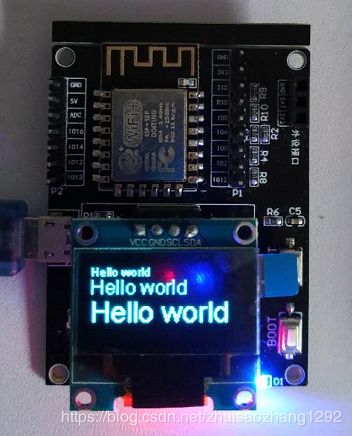ESP8266 OLED显示demo
实际效果:
使用OLED库文件时,需要注意
SSD1306Wire display(0x3c, 2, 14); // 注意SDA和SCL pin的选择,依据实际而定
// Include the correct display library
// For a connection via I2C using the Arduino Wire include:
#include // Only needed for Arduino 1.6.5 and earlier
#include "SSD1306Wire.h" // legacy: #include "SSD1306.h"
// OR #include "SH1106Wire.h" // legacy: #include "SH1106.h"
// For a connection via I2C using brzo_i2c (must be installed) include:
// #include // Only needed for Arduino 1.6.5 and earlier
// #include "SSD1306Brzo.h"
// OR #include "SH1106Brzo.h"
// For a connection via SPI include:
// #include // Only needed for Arduino 1.6.5 and earlier
// #include "SSD1306Spi.h"
// OR #include "SH1106SPi.h"
// Optionally include custom images
#include "images.h"
// Initialize the OLED display using Arduino Wire:
//SSD1306Wire display(0x3c, SDA, SCL); // ADDRESS, SDA, SCL - SDA and SCL usually populate automatically based on your board's pins_arduino.h
SSD1306Wire display(0x3c, 2, 14);
// SSD1306Wire display(0x3c, D3, D5); // ADDRESS, SDA, SCL - If not, they can be specified manually.
// SSD1306Wire display(0x3c, SDA, SCL, GEOMETRY_128_32); // ADDRESS, SDA, SCL, OLEDDISPLAY_GEOMETRY - Extra param required for 128x32 displays.
// SH1106 display(0x3c, SDA, SCL); // ADDRESS, SDA, SCL
// Initialize the OLED display using brzo_i2c:
// SSD1306Brzo display(0x3c, D3, D5); // ADDRESS, SDA, SCL
// or
// SH1106Brzo display(0x3c, D3, D5); // ADDRESS, SDA, SCL
// Initialize the OLED display using SPI:
// D5 -> CLK
// D7 -> MOSI (DOUT)
// D0 -> RES
// D2 -> DC
// D8 -> CS
// SSD1306Spi display(D0, D2, D8); // RES, DC, CS
// or
// SH1106Spi display(D0, D2); // RES, DC
#include
#define DEMO_DURATION 3000
typedef void (*Demo)(void);
int demoMode = 0;
int counter = 1;
void setup() {
Serial.begin(115200);
Serial.println();
Serial.println();
// Initialising the UI will init the display too.
display.init();
display.flipScreenVertically();
display.setFont(ArialMT_Plain_10);
}
void drawFontFaceDemo() {
// Font Demo1
// create more fonts at http://oleddisplay.squix.ch/
display.setTextAlignment(TEXT_ALIGN_LEFT);
display.setFont(ArialMT_Plain_10);
display.drawString(0, 0, "Hello world");
display.setFont(ArialMT_Plain_16);
display.drawString(0, 10, "Hello world");
display.setFont(ArialMT_Plain_24);
display.drawString(0, 26, "Hello world");
}
void drawTextFlowDemo() {
display.setFont(ArialMT_Plain_10);
display.setTextAlignment(TEXT_ALIGN_LEFT);
display.drawStringMaxWidth(0, 0, 128,
"Lorem ipsum\n dolor sit amet, consetetur sadipscing elitr, sed diam nonumy eirmod tempor invidunt ut labore." );
}
void drawTextAlignmentDemo() {
// Text alignment demo
display.setFont(ArialMT_Plain_10);
// The coordinates define the left starting point of the text
display.setTextAlignment(TEXT_ALIGN_LEFT);
display.drawString(0, 10, "Left aligned (0,10)");
// The coordinates define the center of the text
display.setTextAlignment(TEXT_ALIGN_CENTER);
display.drawString(64, 22, "Center aligned (64,22)");
// The coordinates define the right end of the text
display.setTextAlignment(TEXT_ALIGN_RIGHT);
display.drawString(128, 33, "Right aligned (128,33)");
}
void drawRectDemo() {
// Draw a pixel at given position
for (int i = 0; i < 10; i++) {
display.setPixel(i, i);
display.setPixel(10 - i, i);
}
display.drawRect(12, 12, 20, 20);
// Fill the rectangle
display.fillRect(14, 14, 17, 17);
// Draw a line horizontally
display.drawHorizontalLine(0, 40, 20);
// Draw a line horizontally
display.drawVerticalLine(40, 0, 20);
}
void drawCircleDemo() {
for (int i=1; i < 8; i++) {
display.setColor(WHITE);
display.drawCircle(32, 32, i*3);
if (i % 2 == 0) {
display.setColor(BLACK);
}
display.fillCircle(96, 32, 32 - i* 3);
}
}
void drawProgressBarDemo() {
int progress = (counter / 5) % 100;
// draw the progress bar
display.drawProgressBar(0, 32, 120, 10, progress);
// draw the percentage as String
display.setTextAlignment(TEXT_ALIGN_CENTER);
display.drawString(64, 15, String(progress) + "%");
}
void drawImageDemo() {
// see http://blog.squix.org/2015/05/esp8266-nodemcu-how-to-create-xbm.html
// on how to create xbm files
display.drawXbm(34, 14, WiFi_Logo_width, WiFi_Logo_height, WiFi_Logo_bits);
}
Demo demos[] = {drawFontFaceDemo, drawTextFlowDemo, drawTextAlignmentDemo, drawRectDemo, drawCircleDemo, drawProgressBarDemo, drawImageDemo};
int demoLength = (sizeof(demos) / sizeof(Demo));
long timeSinceLastModeSwitch = 0;
void loop() {
// clear the display
display.clear();
// draw the current demo method
demos[demoMode]();
display.setTextAlignment(TEXT_ALIGN_RIGHT);
display.drawString(10, 128, String(millis()));
// write the buffer to the display
display.display();
if (millis() - timeSinceLastModeSwitch > DEMO_DURATION) {
demoMode = (demoMode + 1) % demoLength;
timeSinceLastModeSwitch = millis();
}
counter++;
delay(10);
GPIO_OUTPUT_SET(4, 1);
delay(1000);
GPIO_OUTPUT_SET(4, 0);
delay(1000);
}
